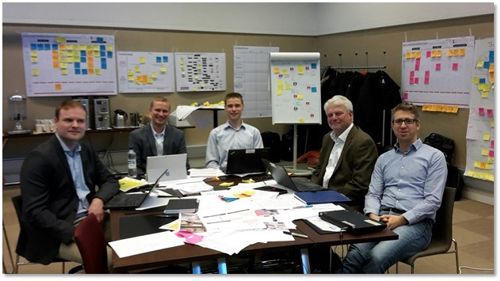Hundreds of ideas, tens of innovations, six customer proposals and two golden tickets
May 29, 2018
Hundreds of ideas, tens of innovations and six customer proposals is what Innovation Pathways – Valmet’s new global training program aimed at supporting Valmet’s profitable growth and building an innovation culture – is all about. Around 30 Valmet experts representing six different countries and all business lines participated in the first Innovation Pathways program in September 2017. Strong involvement from a customer as well as from Valmet management teams paved the way to concrete results and new business.
The first module took participants into the start-up world – quite literally, as the venue was the SUP46 start-up center in Stockholm, Sweden. Participants heard the stories of three Swedish start-ups, learned about new innovation and pitching methods, techniques and tools, and worked on actual customer issues. As an outcome of the first module, teams created minimum viable products (MVP) which were tested with the customer during the months between the modules. To encourage out-of-the-box thinking, the teams were designed to be as diverse as possible with members from different functions and units.
The second module focused on go-to-market planning, monetization options and building business models. The highlight of the week was the Dragon’s Den in which the teams presented their innovative solutions to the customer representatives and Valmet Executive team members.
“I appreciate the commitment of our top management being present in the Dragon’s Den, as well as other Valmet experts providing feedback to teams during “Roundtables” which have been the true highlight for many teams based on feedback collected,” says Ari Saario, the owner of the program from Valmet R&D.
As a concrete outcome of the program the customer gave “Golden tickets” to two ideas which they want to develop further. “The whole concept of the program is new and innovative and watching teams stand up and present their ideas to a panel of “dragons” was really exciting. I am proud of the teams and I especially like the fact that they had the chance to interact with the customer several times during the program,” Ari continues.
Winning Innovation

Team members: Keijo Kivimäki, Tuomas Petänen, Joona Nikunen, Lars Sjödin and Henrik Wallmo
We caught up with two of the five members from the one of the golden ticket teams to hear about their experiences with the program. Both agreed that the program was characterized by high energy, competitive spirit, learning, networking – and solving customer problems. They highlighted that their team worked really well together and that the composition was great, all with different backgrounds and from various parts of the business.
“The teams were assigned with a customer contact and an actual customer challenge. Working with customer took the importance of the innovation program to the next level. Having an exciting topic about sustainability and circular economy and a customer eager to solve their challenge made us even more determined to find a solution, and we knew if we did, it would be important for the future,” says Tuomas Petänen.
"Most of us were not familiar with the topic, which meant that we needed to expand our own knowledge, tap into the team’s collective knowledge and utilize our networks to come out winners,” explains Keijo Kivimäki.
The team pulled together and showed that innovative spirit and diversity goes a long way. The program concluded with a Dragon’s Den-style presentation in which the team presented their winning concept, that was related to turning pulp mill side streams into new value-added products, to the customer and senior management. The team was given one of the two golden tickets handed out and will continue to develop their solution together with the customer.
“We were satisfied with the work we did. As a next step, we’ll verify the concept to test whether it works in practice, with real data. The challenge now will be finding a way to continue to develop the concept with the same pace and energy now that the program has ended and we go back to our normal work,” Keijo explains.
“The program puts you into start-up company mode, brings out your competitive spirit and gives you tools to innovate and solve problems, which can be applied to your own work. I particularly enjoyed learning about minimum viable products and business concept modelling, essentially how to make new business out of an idea,” Tuomas concludes.